Unit 13 We’re trying to save the earth Section A(1a-2d)习题 (新版)人教新目标版
新人教版九年级英语下册Unit 13 We’re trying to save the earth!要点详解
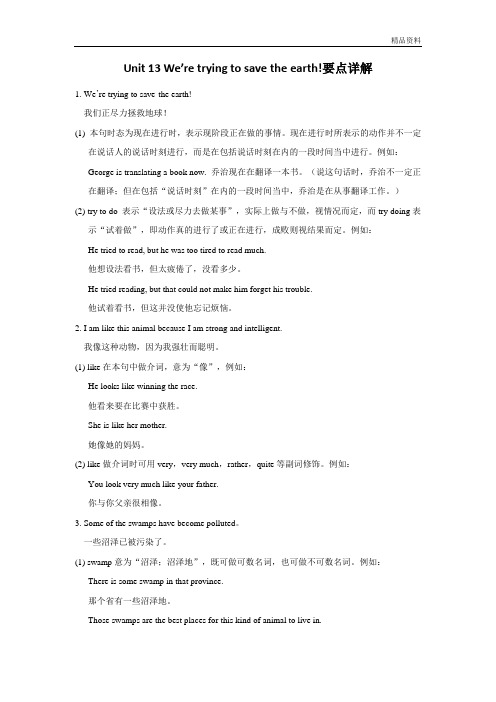
Unit 13 We’re trying to save the earth!要点详解1. We’re trying to save the earth!我们正尽力拯救地球!(1) 本句时态为现在进行时,表示现阶段正在做的事情。
现在进行时所表示的动作并不一定在说话人的说话时刻进行,而是在包括说话时刻在内的一段时间当中进行。
例如:George is translating a book now. 乔治现在在翻译一本书。
(说这句话时,乔治不一定正在翻译;但在包括“说话时刻”在内的一段时间当中,乔治是在从事翻译工作。
)(2) try to do 表示“设法或尽力去做某事”,实际上做与不做,视情况而定,而try doing表示“试着做”,即动作真的进行了或正在进行,成败则视结果而定。
例如:He tried to read, but he was too tired to read much.他想设法看书,但太疲倦了,没看多少。
He tried reading, but that could not make him forget his trouble.他试着看书,但这并没使他忘记烦恼。
2. I am like this animal because I am strong and intelligent.我像这种动物,因为我强壮而聪明。
(1) like在本句中做介词,意为“像”,例如:He looks like winning the race.他看来要在比赛中获胜。
She is like her mother.她像她的妈妈。
(2) like做介词时可用very,very much,rather,quite等副词修饰。
例如:You look very much like your father.你与你父亲很相像。
3. Some of the swamps have become polluted。
一些沼泽已被污染了。
Unit 13 We’re trying to save the earth。全英文说课稿

Unit 13 We’re trying to save theearth。
全英文说课稿Hello everyone。
good morning。
I am honored to present my lesson on Unit 13: We're Trying to Save the Earth。
n A d 1 1a-2c from Book Three。
My n will consist of seven parts。
including an analysis of the teaching material。
teaching aims and key points。
analysis of the students。
teaching methods。
teaching aids。
teaching re。
and blackboard design.To begin。
let's discuss the analysis of the teaching material。
This unit is the final part of middle school and is a XXX and two types of voices。
XXX.Moving on to the teaching aims。
we aim to teach the students the names of XXX。
kangaroos。
chimpanzees。
XXX。
XXX describe these animals。
such as furry。
enormous。
playful。
aggressive。
gray。
spotted。
and XXX.Next。
let's analyze the students。
Our target audience is middle school students who have basic knowledge of EnglishXXX methods to their level and ensure that the material is XXX.Our teaching methods will include a n of lecture-based teaching。
Unit 13 We’re trying to save the earth! Section A (3a-3c)

We’re trying to save the earth!
The river used to be so clean.
The air is badly polluted.
教学重点、难点
1.能正确运用现在进行时,现在完成时,被动语态,情态动词
和used to句型
2.保护环境的措施方法。
(3)Many think that sharks are too strong to be endangered, _____ they are wrong.
(4)_________ there are no scientific studies to support this, a lot of peoplebelieve that shark fins are good for health.
教学活动3
Step 3.Discussion
(1) Have you ever seen a shark?
(2) What do you know about sharks?
教学活动4
Step 4.Practice (3b)
1.Read the passage and dill in the blanks with the words in the box.
课后自评
(5)Sharks may disappear one day ___ we do not do something to stop the sale of shark fins.
(2)Retell the passage according to the words below.
shark’s fin soup, in southernChina,each time,cut off,no longer not only…but also…at the top,drop,be endangered,the strongest around 70 million
九年英语Unit 13 We’re trying to save the earth!

一.重要短语:1.litter/ rubbish/ garbage/ waste/trash垃圾garbage和rubbish含义相同,garbage美国英语,而rubbish英国英语。
这两个词词义较为具体,指必须及时清除的剩余物,比如厨房里的垃圾,生活垃圾等等。
litter指公共场所丢弃的小片/块垃圾,如纸片、塑料袋、易拉罐、饮料瓶等。
waste作名词用时可表“废物”的总称。
另:waste time in doing sth浪费时间做某事take out the trash倒垃圾2.at/in the bottom of在...底部/at the top of在...顶部He shouted at the top of his voice in order that he might be heard.3.advantage-disadvantage1). have/gain/get the (an) advantage over (of) 优于,比……占有优势。
如:You have the advantage over (of) me in experience.你经验比我丰富。
有时用动词gain, get 等。
如:They gained an advantage over the enemy. 他们比敌人占优势。
2). take advantage of=make (full) use of(1) 利用(机会、时机等)。
They took advantage of the fine weather to play tennis.(2) 利用(某人的处境、弱点等)。
He always took full advantage of the mistakes made by his rivals.(3) 欺骗(某人),捉弄(某人),占(某人的)便宜。
He has always been taking advantage of me.3). to sb’s advantage对某人有利。
Unit-13-We're-trying-to-save-the-earth!重难点全解
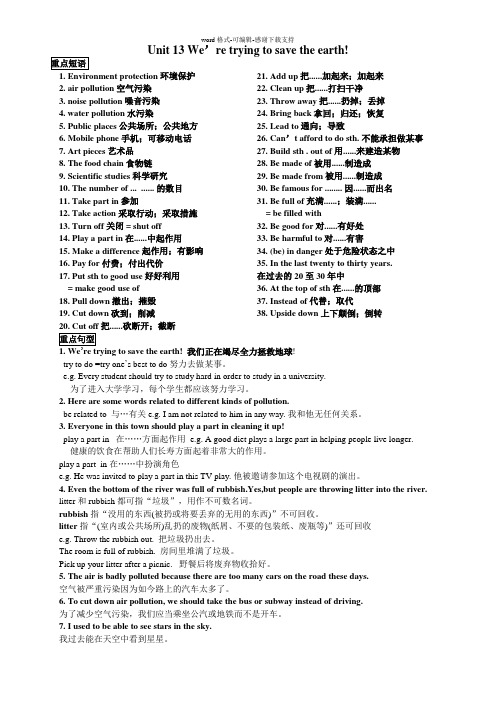
word格式-可编辑-感谢下载支持Unit 13 We’re trying to save the earth!1. Environment protection 环境保护2. air pollution 空气污染3. noise pollution 噪音污染4. water pollution 水污染5. Public places 公共场所;公共地方6. Mobile phone 手机;可移动电话7. Art pieces 艺术品8. The food chain 食物链9. Scientific studies 科学研究10. The number of ... ...... 的数目11. Take part in 参加12. Take action 采取行动;采取措施13. Turn off关闭 = shut off14. Play a part in 在......中起作用15. Make a difference 起作用;有影响16. Pay for 付费;付出代价17. Put sth to good use 好好利用= make good use of18. Pull down 撤出;摧毁19. Cut down 砍到;削减20. Cut off 把......砍断开;截断21. Add up 把......加起来;加起来22. Clean up 把......打扫干净23. Throw away 把......扔掉;丢掉24. Bring back 拿回;归还;恢复25. Lead to 通向;导致26. Can’t afford to do sth. 不能承担做某事27. Build sth . out of 用......来建造某物28. Be made of 被用......制造成29. Be made from 被用......制造成30. Be famous for ........ 因......而出名31. Be full of 充满......;装满......= be filled with32. Be good for 对......有好处33. Be harmful to 对......有害34. (be) in danger 处于危险状态之中35. In the last twenty to thirty years.在过去的20至30年中36. At the top of sth 在......的顶部37. Instead of 代替;取代38. Upside down 上下颠倒;倒转1. We’re trying to save the earth! 我们正在竭尽全力拯救地球!try to do =try one’s best to do 努力去做某事。
人教版九年级英语下册Unit 13 We’re trying to save the earth!S

2.It's good for hetrlth and it doesn’t cost anything!它有利于信康,并且它不花费任何东
西!(教材第98页) be good for意为“对……有益”,反义词组be bad for意为“对……有害”。 辨析:be good for,be good at与be good with
【中考链接2】
1. (2014山东威海中考模拟) Why don't you__A _your
friends to the party? I want to meet them.
A bring
B. brings
C.leaves
D Mr Li. I A my
Unit 13 We’re trying to save the earth!
Section A 课堂精讲
【语法点精讲】
1.(1)We're trying to save the earth!我们正在 竭力拯救地球!
(2)People are throwing litter into the river.人们 正在把垃圾扔进河里。
(2) 表示现阶段正在进行的动作或存在的状态。 如: They are studying hard this term. 他们这个学期学习一直很努力。 (3)come,go,leave,arrive,start等动词用现在 进行时表示将来。 如:The bus is coming soon. 车不久就会来了。 (4)在由while(当……时候)引导的状语从句中,动
English homework at home.
-Don’t forget it to school tomorrow.
Unit 13 We're trying to save the earth重点讲解

Unit13 We're trying to save the earthEndangered animalsDesertificationNatural disastersPollutionnoise pollutionair pollutionwater pollutionWhat can we do?We can stop riding in cars.We can recycle books, bottles and paper.We can turn off the lights when we leave a room.We can turn off the showers while we are washing our hair.Don’t use paper napkins.题一:can; would; could; have to; should; must; may/mightPeople _______ think that big things _______ be done to save the earth. Many forget that saving the earth begins with small things. For example, you ______ save electricity by turning off the lights when you leave a room. You _____ also use reusable bags instead of plastic bags. I think it is a great idea that you now _______ pay for plastic bags in some stores. And instead of driving to school or work, you ______ ride your bike or walk. If it’s far, you ______ take the bus. All these small things _______ add up and become big things that _________ improve the environment. Let’s take action n ow!Grammar FocusWe’re trying to save the earth.The river used to be so clean.The air is badly polluted.No scientific studies have shown that shark fins are good for health.We should help save the sharks.v.--- n.pollute—pollutionact—actionprotect—protectioninspire—inspirationbuild—buildingcreate — creationn.— adj.fame—famouswood---woodenscience---scientifichealth---healthysouth---southerncare---careful/carelessadj.--- n.different---differenceimportant---importanceadj.--- adv.slow---slowlywide---widelysudden---suddenlyreal---really题二:Doing homework ______ me two hours yesterday.A. spentB. spendC. tookD. takeWould you please _____ your pencil to me?A. borrowB. lendC. keepD. hadI _____, but I _____ nothing.A. hear, listenB. heard, listenedC. listen, hearD. listened, heard题三:When we _____ there, they _____ there for an hour.A. got, had beenB. got, gotC. reached, arrivedD. reached, had gotI’ve worked in t his school _____ twenty years.A. sinceB. forC. afterD. whenYou must be very tired. Why not _____ a rest?A. to stop to haveB. to stop havingC. stop to haveD. stop having题四:Mary ______ to school by bike when she lived in China.A. used to goB. was used to goC. was used for goingD. used to goingWe are not sure whether we can ____ the first place in the match.A. winB. hitC. beatD. fight_____ was the weather_____?A. How, likeB. What, likeC. What, look likeD. How, look like题五:---Can I just have a try?---Sure, it doesn’t _____ if you give a wrong answer.A. matterB. troubleC. mindD. care----How many numbers are there on the team?----Eight thi s term . But there will be ten ____next term , I’m not quite sure.A. at allB. at lastC. at leastD. at once---- Where is Sandy ?---- He ___to answer the phone he will be back in a minute.A. had goneB. has goneC. has beenD. went题六:能力提升与拓展In most parts of the world, many students help their schools make less pollution. They join “environment clubs”. In an environment club, people work together to make our environment clean. Here are some things students often do.No-garbage lunches. How much do you throw away after lunch? Environment clubs ask students to bring their lunches in bags that can be used again. Every week they will choose the classes that make the least garbage and report them to the whole school!No-car day. On a no-car day, nobody comes to school in a car-not the students and not the teachers! Cars give pollution to our air, so remember:Walk, jump, bike or run. Use your legs! It’s lots of fun!Turn off the water! Did you know that some toilets can waste twenty to forty m³ of water an hour? In a year, that would fill a small river! In environment clubs, students mend those broken toilets.We love our environment. Let’s work together to make it clean.Environment clubs ask students _______.A. to run to school every dayB. to take exercise every dayC. not to forget to take carsD. not to throw away lunch bagsFrom the passage we know the students usually have lunch ______.A. at schoolB. in shopsC. in clubsD. at homeOn a no-car day, ______ will take a car to school.A. both students and teachersB. only studentsC. neither students nor teachersD. only teachersThe writer wrote the passage to ask students to ______.A. clean schoolsB. make less pollutionC. join clubsD. help teachersUnit13 We're trying to save the earth讲义参考答案题一:may; must; could/can; can/could; have to; can/could; can/could; would; can/could题二:CBD题三:ABC 题四:AAB 题五:ACB 题六:DACB。
UNIT13Weretryingtosavetheearth原文与翻译

UNIT13We'retryingtosavetheearth原文与翻译《牛津初中英语》充分体现了《新课标》的诸多精神。
该教材具有两大特点。
下面是小偏整理的UNIT13We'retryingtosavetheearth 原文与翻译,感谢您的每一次阅读。
UNIT13We'retryingtosavetheearth原文与翻译SectionA1bListenandcompletethesentences.Tony:Hey,Mark,maybewecouldgoswimmingintheriverlaterthi safternoon.Mark:Idon’tthinkIwanttogo,Tony.Tony:Whynot?Mark:Iwastherelastweekendandtheriverwasreallydirty.Eventh ebottomoftheriverwasfullofrubbish,andtherewerenomorefishforf ishermentocatch.Tony:Noway!Itusedtobesoclean.Infact,ithasalwaysbeentheni cestriverinthistown.Mark:Notanymore.Ithinkpeoplearethrowinglitterintotheriver. Factoriesarealsoputtingwasteintotheriver.Tony:That’sterrible!Weshouldwritetothegovernment.Theys houldclosedownthefactories.Mark:Goodidea!ButIthinkeveryoneinthistownshouldhelptocl eanuptheriver,too.Everyoneshouldplayapart,notjustthegovernm entSectionA2aListentotheinterview.thekindsofpollutionthatJasonandSusan talkabout.Interviewer:T odaywe’retalkingtoJason andSusanaboutenvir onmentalproblems.JasonandSusan,canyoutellusaboutsomeofth eproblemsyou’veseen?Jason:Ithinkoneproblemisthattheairisbadlypolluted.Ihardlye verseeblueskiesanymore.Susan:Yes,andIusedtoseethestarsclearly.Interviewer:Whatdoyouthinkhascausedthisproblem?Susan:Well,therearemorecarsontheroadthesedays.Jason:Andfactoriesthatburncoalalsopollutetheairwithalotofb lacksmoke.Interviewer:Whatotherproblemsdoyousee?Susan:Iguessthere’stoomuchrubbishandwasteinthestreets.Jason:Yes!Everydaypeoplearethrowingawaythingslikewoode nchopsticks,plasticbowlsandplasticbags.Susan:They’realsolitteringinpublicplaces,forexample,durin gpicnicsinparks.Thisisturningbeautifulplacesintouglyones.Interviewer:You’reright.Theseareseriousproble msforourenv ironment.Next,let’stalkaboutthethingswecandotohelp.SectionA2bListenagainandcompletethesentences.Interviewer:T odaywe’retalkingtoJasonandSusanaboutenvir onmentalproblems.JasonandSusan,canyoutellusaboutsomeofth eproblemsyou’veseen?Jason:Ithinkoneproblemisthattheairisbadlypolluted.Ihardlye verseeblueskiesanymore.Susan:Yes,andIusedtoseethestarsclearly.Interviewer:Whatdoyouthinkhascausedthisproblem?Susan:Well,therearemorecarsontheroadthesedays.Jason:Andfactoriesthatburncoalalsopollutetheairwithalotofb lacksmoke.Interviewer:Whatotherproblemsdoyousee?Susan:Iguessthere’stoomuchrubbishandwasteinthestreets.Jason:Yes!Everydaypeoplearethrowingawaythingslikewoodenchopsticks,plasticbowlsandplasticbags.Susan:They’realsolitteringinpublicplaces,forexample,d urin gpicnicsinparks.Thisisturningbeautifulplacesintouglyones.Interviewer:You’reright.Theseareseriousproblemsforourenv ironment.Next,let’stalkaboutthethingswecandotohelp.SectionA2dRoleplaytheconversation.JasonandSusan,whatareyourideasforsolvingtheseproblems?Well,tocutdownairpollution,weshouldtakethebusorsubwayin steadofdriving.Yeah,orrideabike.Thereareotheradvantagesofbikeriding.It'sg oodforhealthitdoesn'tanythingGreatideas!Whataboutwastepollution?Mmm,Ithinksimplethingslikebringingabagtogoshoppingcan help.Istarteddoingthatayearago.Me,tooAlso,Inevertakewoodenchopsticksorplasticforkswhen Ibuytakeawayfood.Iusetheonesathome.Andremembertothrowrubbishinthebinsandkeeppublicplace scleanandbeautifulforeveryone.Sotogether,ouractionscanmakeadifferenceandleadtoabetter future!SectionA3aReadthepassageaboutsharksandcompletethefactsheetbelow.SavetheSharks!Manyhaveheardofsharkfinsoup.Thisfamousandexpensivedis hisespeciallypopularinsouthernChina.Butdoyourealizethaty ou’r ekillingawholesharkeachtimeyouenjoyabowlofsharkfinsoup?Whenpeoplecatchsharks,theycutofftheirfinsandthrowthesha rkbackintotheocean.Thisisnotonlycruel,butalsoharmfultotheenvir onment.Withoutafin,asharkcannolongerswimandslowlydies.Sharksar eatthetopofthefo odchainintheocean’secosystem.Iftheirnumber sdroptoolow,itwillbringdangertoalloceanlife.Manybelievethatsharkscanneverbeendangeredbecausethey arethestrongestintheirfoodchain.Butinfact,around70millionshark sarecaughtandtradedinthisindustryeveryyear.Thenumbersofsomekindsofsharkshavefallenbyover90percen tinthelast20to30years.Environmentalprotectiongroupsaroundthe world,suchasWildAidandtheWWF,areteachingthepublicabout“fi nning”.Theyhaveevenaskedgovernmentstodeveloplawstostopthesal eofsharkfins.Sofar,noscientificstudieshaveshownthatsharkfinsare goodforhealth,sowhyeatthem?Helpsavethesharks!SectionB1cListenandcheck(√)thethingsthatJuliaandJacktalkabout.Jack:Turnoffthelights,Julia.Itsaveselectricity.Julia:Oh,Iusuallydothat.Iwasjustinahurry.Jack:Isee.I’vejustreadabookwh ichgivesideasabouthowweca nsavetheenvironment.Forexample,youshouldturnofftheshowerw henyou’rewashingyourhair.Julia:Oh,Iwouldneverdothat.Ihaveveryshorthair.Itonlytakesaf ewminutestowash.Whatelsedoesitsay?Jack:Youshouldtakeyourownbagswhenyougoshopping.Julia:Oh,that’seasy.I’lldothatfromnowon.Whatelse?Jack:Peopleshouldstopridingincarsandstartridingbikes.Julia:Noway!Itwouldtakeme45minutestogettoschoolbybike!Jack:Butit’sgoodfortheenvironment!Besides,Ilikeridingmybi ke.Julia:Yes,andyoualsoliveclosetoschool!SectionB1dListenagain.Check(√)thethingsthatJuliaisdoingnow,thethings shewilldointhefutureandthethingsshewouldneverdo.Jack:Turnoffthelights,Julia.Itsaveselectricity.Julia:Oh,Iusuallydothat.Iwasjustinahurry.Jack:Isee.I’vejustreadabookwhichgiveside asabouthowweca nsavetheenvironment.Forexample,youshouldturnofftheshowerw henyou’rewashingyourhair.Julia:Oh,Iwouldneverdothat.Ihaveveryshorthair.Itonlytakesaf ewminutestowash.Whatelsedoesitsay?Jack:Youshouldtakeyourownbagswhenyougoshopping.Julia:Oh,that’seasy.I’lldothatfromnowon.Whatelse?Jack:Peopleshouldstopridingincarsandstartridingbikes.Julia:Noway!Itwouldtakeme45minutestogettoschoolbybike!Jack:Butit’sgoodfortheenvironment!Besides,Ilikeridingmybi ke.Julia:Yes,andyoualsoliveclosetoschool!SectionB2bReadthepassageandcompletethechartbelow.Rethink,Reuse,Recycle!Doyouoftenthrowawaythingsyoudon’tneedanymore?Have youeverthoughtabouthowthesethingscanactuallybeputtogoodu se?Nothingisawasteifyouhaveacreativemind.Youhaveprobablyn everheardofAmyHayes,butsheisamostunusualwoman.Shelivesin ahouseintheUKthatshebuiltherselfoutofrubbish.Thewindowsanddoorscomefromoldbuildingsaroundhertow nthatwerepulleddown.Thetopofthehouseisanoldboatturnedupsi dedown.Andthegateinfrontofherhouseismadeofrocksandoldglas sbottles.AmyrecentlywonaprizefromtheHelpSaveOurPlanetSociety.Thepresidentsaid,“Amyisaninspirationtousall.”Amyisn’ttheonlyonewhoisgoodatrecycling.JessicaWongfro mHongKongusesoldclothesthatpeop ledon’twearanymoretoma kebags.Shehasbeendoingthisforafewyearsnow.Sheopenedasmallshopwhereshesellsherbags,andshehasalso setupawebsitetosellthemonline.Sheespeciallylikestouseoldjeanst omakehandbags.Herbagsarecuteanduseful.“Iplantowriteabookaboutnewwaystouseoldclothes,”shesai d.“Ihopepeoplecanreadmybookandenjoyit!”WangTaosetupasmallbusinessinShanghaifouryearsago.Heisk nownforusingironandothermaterialsfromoldcarstomakebeautifu lartpieces.Somearelargepiecesthatlooklikeanimalsorhumans,and somearesmallerpiecesyoucanputathome.Themorepopularworks canevenbeseeninartshopsaroundthecity.WangTaohopestosetupa“metalart”themeparktoshowpeop letheimportanceofenvironmentalprotection.Notonlycantheartbri nghappinesstoothers,butitalsoshowsthatevencold,hardironcanb ebroughtbacktolifewithalittlecreativity.翻译:SectionA2d采访者:贾森和苏珊,对于解决这些问题,你们有什么想法?贾森:为了减少空气污染,我们应该乘坐公共汽车或者地铁,而不是开车。
人教版九年级全一册英语Unit-13-We’re-trying-to-save-the-earth-教案
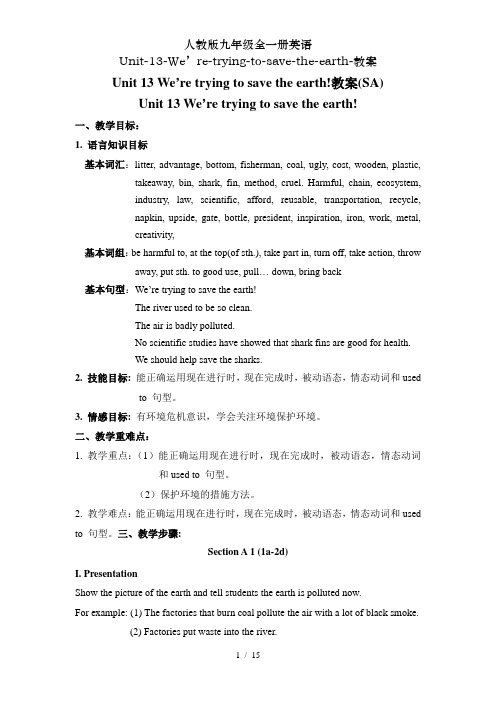
Unit 13 We’re trying to save the earth!教案(SA)Unit 13 We’re trying to save the earth!一、教学目标:1. 语言知识目标基本词汇:litter, advantage, bottom, fisherman, coal, ugly, cost, wooden, plastic, takeaway, bin, shark, fin, method, cruel. Harmful, chain, ecosystem,industry, law, scientific, afford, reusable, transportation, recycle,napkin, upside, gate, bottle, president, inspiration, iron, work, metal,creativity,基本词组:be harmful to, at the top(of sth.), take part in, turn off, take action, throw away, put sth. to good use, pull… down, bring back基本句型:We’re trying to save the earth!The river used to be so clean.The air is badly polluted.No scientific studies have showed that shark fins are good for health.We should help save the sharks.2. 技能目标: 能正确运用现在进行时,现在完成时,被动语态,情态动词和usedto 句型。
3. 情感目标:有环境危机意识,学会关注环境保护环境。
二、教学重难点:1. 教学重点:(1)能正确运用现在进行时,现在完成时,被动语态,情态动词和used to 句型。
人教版英语PEP英语九年级下册 Unit 13 We’re trying to save the e
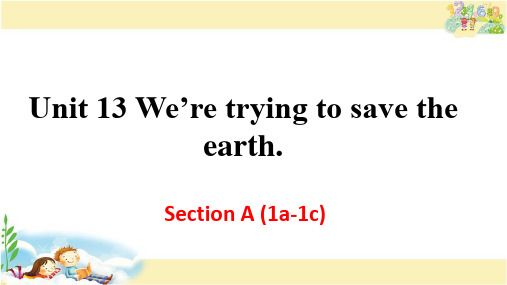
problem be
to ___c_lo_s_e_d_o_w_n___ the factories. Everyone should
solved?
help to ___c_l_e_an__u_p____the river.
Listen again and answer the questions.
water pollution
land pollution
Do you know what caused the pollution? What should we do to save the earth?
Presentation
1a Here are some words related to different kinds of pollution Write them in the box below. Then add more words.
What caused the People are throwing ____l_it_te_r_______ into the river.
problem?
Factories are putting ____w__a_st_e______ into the river.
How should the We should write to the __g_o_v_e_r_n_m__en_t__ and ask them
健康的饮食在帮助人们长寿方面起着非常大的作用。
Homework
1. Preview the conversation in 2d. 2. Do the exercises in students’ book.
Thank you!
Unit 13 We’re trying to save the earth!
初中英语《Unit 13 We’re trying to save the earth!》优质课教案、教学设计

Unit 13 We’re trying to save the earth!教师寄语Saving the earth is saving ourselves.学习目标:1.知识目标:掌握本部分的单词、短语、句型和语法2.能力目标:能熟练自如地描述相关话题。
3.情感目标:通过小组活动和合作,在多种英语学习情景中用英语交流。
重难点:本单元相关语法点的掌握及运用。
学习过程:壱.Greetings弐.Go over the wordsⅠ.K e y w o rd s(1)1.l itter (同义词)2.b ottom (反义词)3.f isherman (复数)4.u gly (反义词)5.a dvantage (反义词)6.c ost (过去式)(过去分词)7.w ooden (名词)8.s cientific ( 科学)(科学家)9.c reativity (形容词)(动词)10.harmful (名词)Ⅱ.K e y w o rd s(2)1.煤11.塑料的2.方法12.鲨鱼3.残忍的13.生态系统4.工业,行业14.可重复使用的5.买得起15.交通,运输6.总统,负责人16.法律7.作品17.餐巾纸8.瓶子18.灵感,榜样9.大门19.金属10.回收使用20.鱼鳍三.Do some exercise about wordsWe should put up notice to stop from (乱扔)。
2.The teacher asked us to find a way to pick up the coinsat the (底部)of the bottle.3.There are no more fish for (渔夫)to catchin the river.4.We should take the paper bags to go shopping insteadof the (塑料)ones.5.Could you please tell us another (优点)ofriding bike to work?四.Review some phrasesII.Phrase:1.充满2.扔进3.在……发挥作用4.扔掉5.减少6.起作用;有影响7.导致,通向8.切除9.不但……而且……10.对……有害11.在……顶部或顶端12.上下颠倒13.参加14.恢复,使想起15.关掉16.付费;付出代价17.有一个创新的头脑18.采取行动19.好好利用20.拆下,摧毁21.创建,建立22.因……而著名23.用……建成五.Language points小组合作讨论并完成练习六.本单元语法复习教师讲解复习讨论七.中考链接,挑战中考八.Homework保护人类共同的家园—地球是每个人的责任和义务。
人教版九年级英语Unit13_we’re_trying_to_save_the_earth
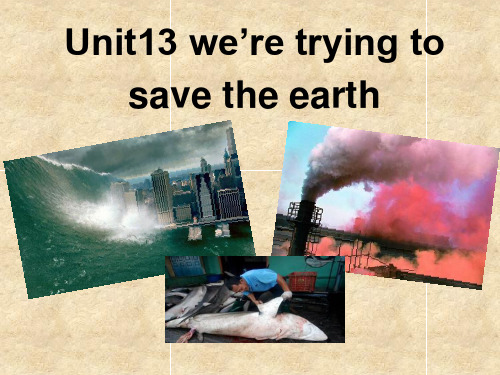
What should we do to save the earth?
1.We should tell the people who drive to drive less. 2.We should tell the factories which produce the waste gas and water to produce less. 3.We should tell ourselves not to litter in the river. 4.We should tell ourselves to use shopping bags that we are carrying when we’re shopping. 5.Maybe we should write to the newspapers ,magazines or the government for help. 6.Maybe we are able to use the internet for fighting with the pollution as well.
Unit13 we’re trying to save the earth
Unit13 we’re trying to save the earth
What is happening to the earth? Why should we try to save it?
the polluted river
Though I always feel our voice is too weak to be heard. I still believe it’s a good idea to do something to help save our earth.
人教版英语九全Unit 13 We're trying to save the earth!
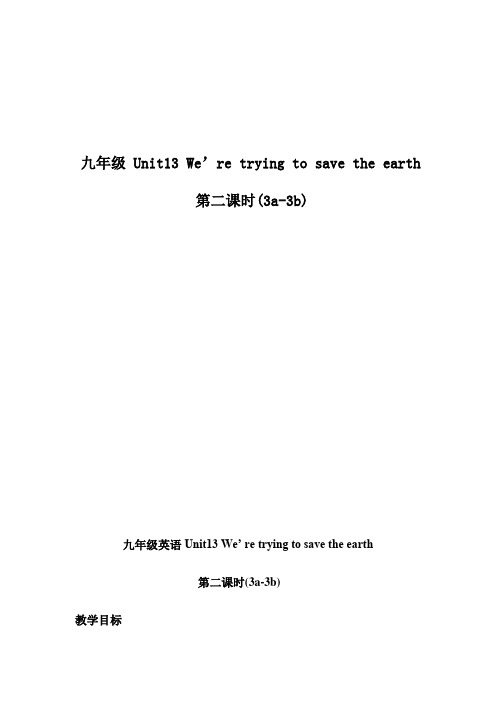
九年级Unit13 We’re trying to save the earth第二课时(3a-3b)九年级英语Unit13 We’ re trying to save the earth第二课时(3a-3b)教学目标知识与技能1.Master the key words.2.To talk about pollution and environmental protection.3.Improve students’rea ding and comprehensive skills.过程与方法1. Lean the target language by reading a passage about protecting animals.2.Autonomous and cooperative approach.情感态度与价值观Be aware of the importance of reducing pollution and protecting animals. 重难点1.Master the key words and phrase.2.Improve students’ reading and comprehensive skills.教学过程Step1. Warm up1.GreetingsTeacher says: A new term has begun already, we are back to busy school life again. You have to do a lot of homework and study for kinds of tests. You are stressed out, so you should learn to relax and not put too much pressure on yourselves. How do you relax? When the students answer: I listen to music to relax, teacher shows them a video of a singer, lead to the new phrase: “not only…but also”.Step2. Presentation1.lead in.1)Show some pictures of animals to the students,and let them master some basic knowledge about animals.2)Ask students to answer the following questions in the form of competition.2.Teach activity 3a.First, tell students in this class we will learn how to talk about protecting animals.Give students several minutes to read the passage individually.Then, invite three students to read the article to the class.Invite some students to answer the questions to check the work.List some difficult language points on the blackboard and analysis them. Step3.PracticeTeach activity 3b.First,lead students to read the instruction to know how to do this activity. Ask students to have a quick look at the words in the box.Encourage volunteers to explain the meaning of each word.Then, give them several minutes to complete the sentences using those words individually.As they work, move around the room checking the progress.Later invite five students to check the answers.Answers:1. When 2.so 3.but 4.Although 5. IfAsk students into groups to talk about some methods to protect them. Step4 SummaryIn this period,we mainly learned to talk about endangered animals and how to protect them through a reading material. Meanwhile, we also learned some key words and structures.Step5 Homework1.Finish the exercises in the workbook.\2.Preview the next period.板书设计教学反思在本节课教学过程中,我发现学生对这个话题很感兴趣,但由于教材设计的局限性,不能直观的观察动物,学生还不能完全体会到保护动物的重要性,因此还需要尽可能地多采用多媒体设备进行教学。
英语九年级人教版 Unit 13 We’re trying to save the earth! S
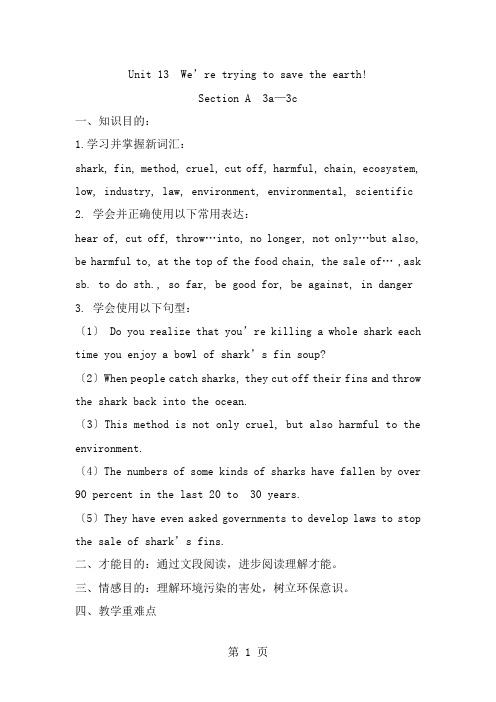
Unit 13 We’re trying to save the earth!Section A 3a—3c一、知识目的:1.学习并掌握新词汇:shark, fin, method, cruel, cut off, harmful, chain, ecosystem, low, industry, law, environment, environmental, scientific 2. 学会并正确使用以下常用表达:hear of, cut off, throw…into, no longer, not only…but also, be harmful to, at the top of the food chain, the sale of… ,ask sb. to do sth., so far, be good for, be against, in danger 3. 学会使用以下句型:〔1〕 Do you realize that you’re killing a whole shark each time you enjoy a bowl of shark’s fin soup?〔2〕When people catch sharks, they cut off their fins and throw the shark back into the ocean.〔3〕This method is not only cruel, but also harmful to the environment.〔4〕The numbers of some kinds of sharks have fallen by over 90 percent in the last 20 to 30 years.〔5〕They have even asked governments to develop laws to stop the sale of shark’s fins.二、才能目的:通过文段阅读,进步阅读理解才能。
人教版九年级英语,Unit 13 We’re trying to save the earth.Se
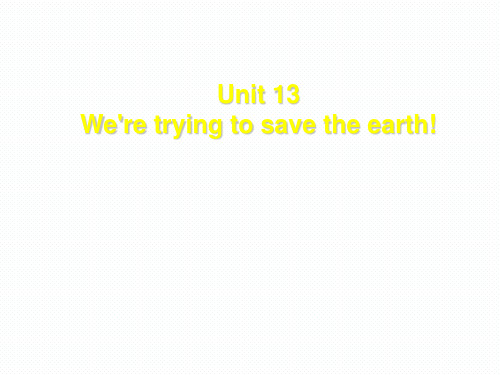
Yes, it used to be so clean.
But I was there last weekend and the river was really dirty.
Wห้องสมุดไป่ตู้at caused the problem?
People are throwing litter into the river.
1a different kinds of pollution. Write
them in the box below. Then add
more words.
noise pollution air pollution water pollution
_l_ou__d_m__u_si_c___ __f_a_ct_o_r_ie_s___ ____sh_i_p_s_____ __p_l_an__es______ __sm__o_k_in_g____ ___r_u_b_b_i_sh____ _m__o_b_il_e_p_h_o_n_e_s ___ca_r_s______ ___l_it_t_er_i_n_g___ b_u_i_ld_i_n_g_h_o_u_se_s_ b_u_il_d_in_g_h_o_u_s_es_ ___f_ac_t_o_r_ie_s___
The room is full of rubbish. 房间里堆满了垃圾。
Pick up your litter after a picnic. 野餐后将废弃物收拾好。
bottom n. 底部;最下部
fisherman n. 钓鱼的人
Here are some words related to
4. The city __u_s_e_d____ __t_o____ (过去) be so clean.
- 1、下载文档前请自行甄别文档内容的完整性,平台不提供额外的编辑、内容补充、找答案等附加服务。
- 2、"仅部分预览"的文档,不可在线预览部分如存在完整性等问题,可反馈申请退款(可完整预览的文档不适用该条件!)。
- 3、如文档侵犯您的权益,请联系客服反馈,我们会尽快为您处理(人工客服工作时间:9:00-18:30)。
Unit 13 We’re trying to save the earthSection A(1a—2d)Ⅰ.根据句意及所给首字母提示,补全句中所缺单词。
1. C can be used to produce electricity.2. The new car c a lot of money, but it was certainly worth it.3. There is a w bed, a table and two chairs in this small room.4. It is a very clean city. You will hardlyfind l when you walk along the street.5. My uncle is a great f and he caught four fish this morning.6. Some cups in the shop are nice and expensive and the othersare u and cheap.7. Living in this street has a lot of a . The only drawback (弊端) is noise.Ⅱ.根据句意,从方框中选择恰当的短语填空,有的需要变换形式。
1. What a mess! You should ____________ your room now.2. Every farmer knows that weather ____________ farming.3. As we all know, smoking too much can ____________ cancer and many other illnesses.4. He said he would ____________ us when he left home but we haven't heard from him so far.5. The manager asked me to ____________ the report, because he didn't want to speak too long at the meeting.Ⅲ.根据汉语意思完成英语句子,每空一词。
1. 牛奶对孩子们的健康有好处。
Milk _________ _________ _________ children's health.2. 辛迪,请记得帮我寄信。
Cindy, please _________ _________ _________ me send the letter.3. 刚才乔重重地摔到楼梯下面。
Joe landed heavily _________ _________ _________ _________ the stairs just now.4. 我们没有茶。
你愿意喝点咖啡代替茶吗?We don't have any tea. Would you like coffee _________ _________ tea?5. 人们普遍认为,教育会对一个人的生活产生影响。
People generally agree that education can _________ _________ _________ _________ a person's life.Ⅳ.根据对话内容,从方框中选择恰当的选项补全对话,其中有两项多余。
A: Hi, Vera. Would you like to help protect the environment?B: (1)_________A: Well first, you can start by turning off the lights before you leave the room. B: Yes. That's easy. (2)_________A: Second, you can ride a bicycle. (3)_________B: That will save money, too. Whatelse?A: The third way is turning off the shower when you're not using it.B: You mean, when I have shampoo (香波) in my hair?A: Yes. (4)_________ Every minute helps. And the fourth, take a bag when you go shopping. Don't use plastic bags.B: OK. (5)_________ I'll tell them.答案Section A (1a—2d)Ⅰ. 1. Coa l 2. cost 3. wooden / wood4. litter5. fisherman6. ugly7. advantagesⅡ. 1. clean up 2. plays a part in3. lead to4. write to5. cut downⅢ. 1. is good for 2. remember to help3. at the bottom of4. instead of5. make a difference toⅣ. 1-5 BDGAE Unit 13 We’re trying to save the earthSection A(3a—Grammar Focus)Ⅰ.根据句意及所给汉语提示,写出句中所缺单词。
1. Greg has always wanted a guitar, but he can't _________(买得起) one.2. Many countries made _________(法律) to stop smoking in public places.3. The trade with foreign countries caused China's _________(工业) to develop quickly.4. Henry was so excited when he received an invitation to speak at a(n) _________(科学的) meeting.5. The poor workers were often made to work more than 16 hours a day by the_________(残酷的) boss.Ⅱ.根据语境及所给汉语提示,完成下列句子或对话,每空一词。
1. This word _________ _________(以……开始) the letter “a”.2. Who is Claire? I have never _________ _________(听说) her.3. The waiter made a mistake in _________ _________(加起来) the bill (账单).4. Alex _________ _________ _________(参加) many after-class activities when he was at junior high school.5. The government _________ _________ _________(采取了快速的行动) to help the people in the train accident.6. —How much shall I _________ _________(付费) the phone call?—You don't have to. This is free.7. After the earthquake, the villagers were completely _________ _________(隔绝) from the outside.8. Nelly loves fast food a lot though many others think it _________ _________ _________(对……有害) health.9. Can the man shoot the bird _________ _________ _________ _________(在……顶部) the tree?10. Do you think that we should _________ _________ _________(使用公共交通) to protect our environment?Ⅲ.根据短文内容及括号内所给(短语)动词的提示,用正确的时态或语态补全短文,使短文完整、通顺。
The clockwork radio (发条式收音机) is the only radio that doesn't need batteries (电池) or electricity. It is powered by turning the handle (手柄) for a minute. Nowadays, thousands of these radios (1)_________(make) every day.The clockwork radio (2)_________(invent) in 1991 by Trevor Bayliss, a British inventor. Trevor had the idea while he (3)_________(listen to) some news on the radio about Africa. It (4)_________(report) that Africans were dying of Aids and there was no easy way to send them information about the disease.But no one would help Trevor develop his idea for a new kind of radio. Finally, in 1993, his invention (5)_________(show) on a TV program, and afterwards, a South African businessman (6)_________(hear of) Trevor's clever idea and contacted (联系) him. The first Freeplay radios (7)_________(build) in South Africa in 1995.Since then, the radios (8)_________(be) a great success. Trevor has been given many prizes, including one from Nelson Mandela.Trevor (9)_________(hang) a letter on the wall in his house. It(10)_________(write) in 1991 by another engineer, who explained why he thought Trevor's idea for a clockwork radio couldn't possibly work!答案Section A (3a—Grammar Focus)Ⅰ. 1. afford 2. laws 3. industry4. scientific5. cruelⅡ. 1. begins / starts with 2. heard of 3. adding up 4. took part in5. took quick action6. pay for7. cut off 8. is harmful to / bad for9. at the top of10. use public transportationⅢ. 1. are made 2. was invented3. was listening to4. was reported5. was shown6. heard of7. were built 8. have been9. has hung 10. was written。
